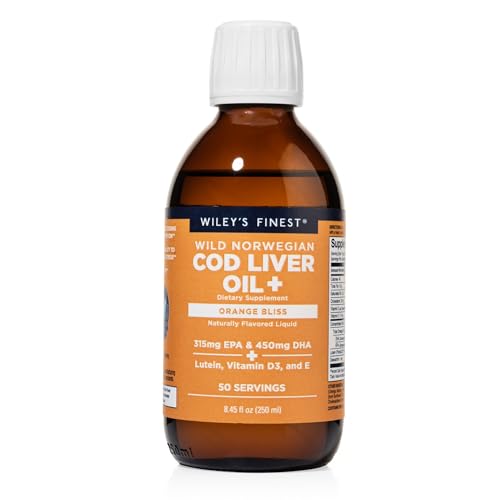
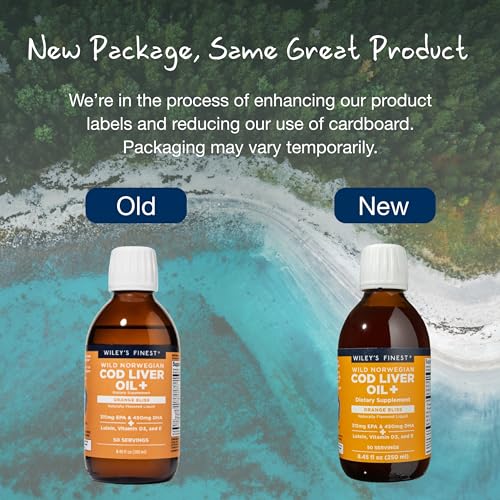
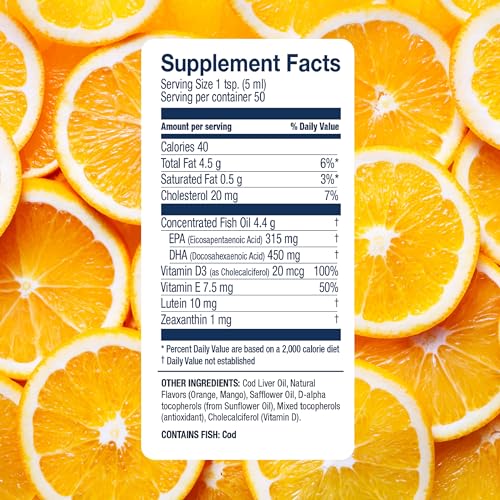
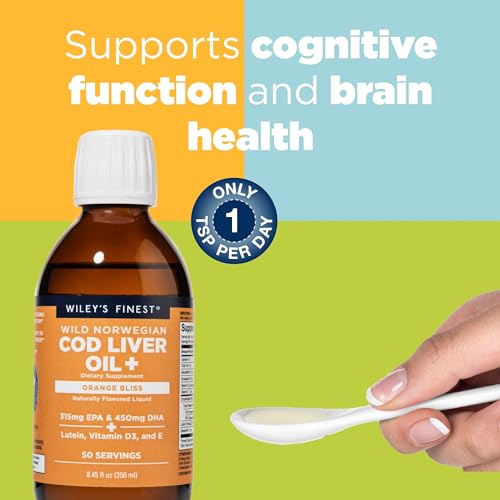
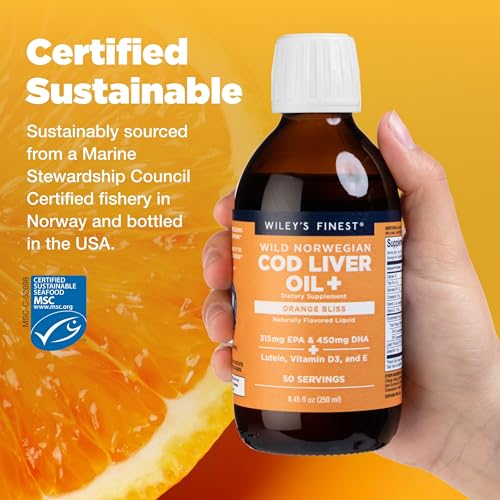
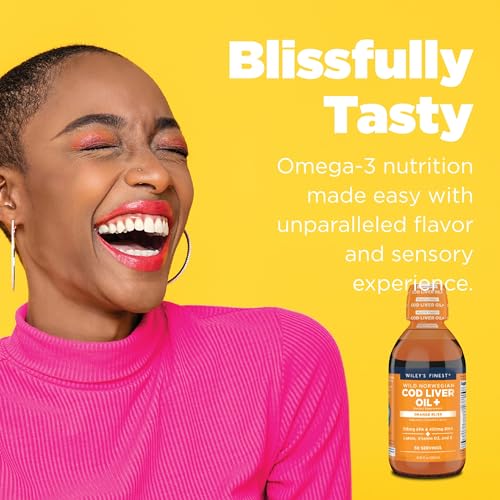
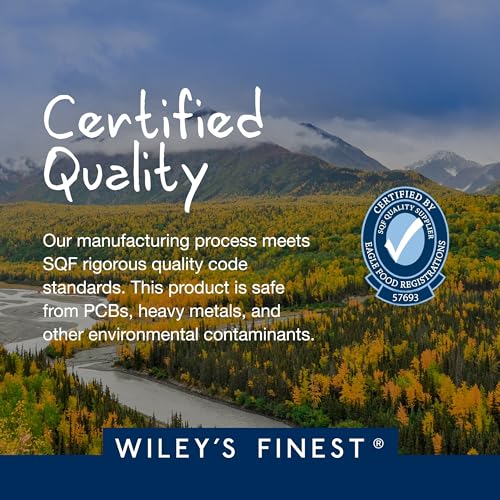
Wiley's Finest Omega-3 Cod Liver Oil - Supports Heart & Brain Health, Orange Flavor - 755mg, 8.45oz


Vitamin D3
High RiskVitamin D3, also known as cholecalciferol, is a fat-soluble vitamin important for calcium metabolism and bone health. It is synthesized in the skin upon exposure to sunlight and is also found in some foods and supplements. Its primary function is to promote the absorption of calcium and phosphorus in the body.
Sustai Insights
Vitamin D3 offers functional benefits such as supporting bone health and immune function. However, excessive intake can lead to toxicity, presenting risks like hypercalcemia. Environmental concerns include its potential for bioaccumulation. Regulatory bodies impose usage restrictions due to these risks, resulting in a high overall risk assessment. Safe usage practices should be observed, and alternatives such as vitamin D2 may be considered.
Orange
Low RiskOrange, derived from the fruit of the Citrus sinensis tree, is commonly used in various products for its aromatic properties and as a flavoring agent. It is often employed for its potential to enhance sensory appeal in food and cosmetic formulations.
Sustai Insights
Orange offers functional benefits such as flavor enhancement and fragrance in products. It is generally considered safe with low concerns regarding carcinogenicity, allergies, and reproductive toxicity. Environmental risks are minimal, as it does not significantly contribute to pollution or bioaccumulation. Regulatory bodies have no current restrictions on its use. Overall, orange is assessed to have a low risk profile, making it a viable option in formulations.
Cod Liver Oil
Low RiskCod liver oil is a fixed oil expressed from the livers of codfish, primarily used for its high content of omega-3 fatty acids and vitamins A and D. It is commonly incorporated into dietary supplements and skincare products for its nutritional and moisturizing properties.
Sustai Insights
Cod liver oil offers functional benefits such as providing essential fatty acids and vitamins, which support overall health. It is generally regarded as low risk for adverse health effects, with no significant concerns regarding carcinogenicity, allergies, or reproductive toxicity. Environmental risks are minimal, and it is not classified as a pollutant. Regulatory bodies do not impose major restrictions on its use. Safe usage practices should be observed, particularly regarding dosage to avoid excessive vitamin A intake. Alternatives include fish oil or plant-based omega-3 sources for sustainability. Overall, the risk associated with cod liver oil is low.
Carthamus Tinctorius (Safflower) Seed Oil
Low RiskCarthamus tinctorius (safflower) seed oil is derived from the seeds of the safflower plant. It is primarily used in cosmetic formulations for its emollient properties, helping to moisturize and soften the skin. The oil is rich in unsaturated fatty acids and is often employed in skin care products for its potential benefits to skin health.
Sustai Insights
Safflower seed oil offers functional benefits as a moisturizer and emollient, contributing to skin hydration without significant irritation. It is generally recognized as low risk concerning health impacts, with minimal concerns over carcinogenicity, allergies, and reproductive toxicity. Environmentally, it poses low risks, being non-bioaccumulative and not a significant pollutant. Regulatory bodies do not impose restrictions on its use, underscoring its safety profile. While there are no widely recognized safer alternatives, users should ensure proper application to mitigate any potential skin irritation. Overall, this ingredient is assessed as low risk.
Helianthus Annuus (Sunflower) Seed
Low RiskHelianthus annuus (sunflower) seed is derived from the seeds of the sunflower plant and is commonly used in various cosmetic and personal care products. It serves primarily as an emollient and skin conditioning agent, providing moisture and enhancing the texture of formulations.
Sustai Insights
Helianthus annuus (sunflower) seed offers functional benefits, including skin conditioning and moisturizing properties, while being sustainably sourced and biodegradable. Health risks are minimal, with low concerns for carcinogenicity, allergies, and reproductive toxicity. Environmentally, it presents low risks of pollution or bioaccumulation. Regulatory assessments indicate no current restrictions. Overall, it is considered a low-risk ingredient, and safe usage practices should be maintained. Alternative ingredients may include other plant-based oils, but the sunflower seed oil remains a viable option.
Tocopherol, D Alpha
Low RiskTocopherol, specifically d-alpha tocopherol, is a naturally occurring form of Vitamin E. It is commonly used in cosmetic and personal care products primarily for its antioxidant properties, helping to protect formulations from oxidation and extend shelf life.
Sustai Insights
D-alpha tocopherol provides effective antioxidant benefits, contributing to product stability. It is sustainably sourced and generally regarded as safe, with low concerns regarding carcinogenicity, allergies, and reproductive toxicity. However, there are minor concerns about endocrine disruption. Regulatory bodies have not imposed significant restrictions, indicating low overall risk. Recommended usage practices include adhering to established safe concentration thresholds. Alternatives, such as other forms of Vitamin E or plant-based antioxidants, may also be considered.
Vitamin D3
High RiskVitamin D3, also known as cholecalciferol, is a fat-soluble vitamin important for calcium metabolism and bone health. It is synthesized in the skin upon exposure to sunlight and is also found in some foods and supplements. Its primary function is to promote the absorption of calcium and phosphorus in the body.
Sustai Insights
Vitamin D3 offers functional benefits such as supporting bone health and immune function. However, excessive intake can lead to toxicity, presenting risks like hypercalcemia. Environmental concerns include its potential for bioaccumulation. Regulatory bodies impose usage restrictions due to these risks, resulting in a high overall risk assessment. Safe usage practices should be observed, and alternatives such as vitamin D2 may be considered.
Orange
Low RiskOrange, derived from the fruit of the Citrus sinensis tree, is commonly used in various products for its aromatic properties and as a flavoring agent. It is often employed for its potential to enhance sensory appeal in food and cosmetic formulations.
Sustai Insights
Orange offers functional benefits such as flavor enhancement and fragrance in products. It is generally considered safe with low concerns regarding carcinogenicity, allergies, and reproductive toxicity. Environmental risks are minimal, as it does not significantly contribute to pollution or bioaccumulation. Regulatory bodies have no current restrictions on its use. Overall, orange is assessed to have a low risk profile, making it a viable option in formulations.
Cod Liver Oil
Low RiskCod liver oil is a fixed oil expressed from the livers of codfish, primarily used for its high content of omega-3 fatty acids and vitamins A and D. It is commonly incorporated into dietary supplements and skincare products for its nutritional and moisturizing properties.
Sustai Insights
Cod liver oil offers functional benefits such as providing essential fatty acids and vitamins, which support overall health. It is generally regarded as low risk for adverse health effects, with no significant concerns regarding carcinogenicity, allergies, or reproductive toxicity. Environmental risks are minimal, and it is not classified as a pollutant. Regulatory bodies do not impose major restrictions on its use. Safe usage practices should be observed, particularly regarding dosage to avoid excessive vitamin A intake. Alternatives include fish oil or plant-based omega-3 sources for sustainability. Overall, the risk associated with cod liver oil is low.
Carthamus Tinctorius (Safflower) Seed Oil
Low RiskCarthamus tinctorius (safflower) seed oil is derived from the seeds of the safflower plant. It is primarily used in cosmetic formulations for its emollient properties, helping to moisturize and soften the skin. The oil is rich in unsaturated fatty acids and is often employed in skin care products for its potential benefits to skin health.
Sustai Insights
Safflower seed oil offers functional benefits as a moisturizer and emollient, contributing to skin hydration without significant irritation. It is generally recognized as low risk concerning health impacts, with minimal concerns over carcinogenicity, allergies, and reproductive toxicity. Environmentally, it poses low risks, being non-bioaccumulative and not a significant pollutant. Regulatory bodies do not impose restrictions on its use, underscoring its safety profile. While there are no widely recognized safer alternatives, users should ensure proper application to mitigate any potential skin irritation. Overall, this ingredient is assessed as low risk.
Helianthus Annuus (Sunflower) Seed
Low RiskHelianthus annuus (sunflower) seed is derived from the seeds of the sunflower plant and is commonly used in various cosmetic and personal care products. It serves primarily as an emollient and skin conditioning agent, providing moisture and enhancing the texture of formulations.
Sustai Insights
Helianthus annuus (sunflower) seed offers functional benefits, including skin conditioning and moisturizing properties, while being sustainably sourced and biodegradable. Health risks are minimal, with low concerns for carcinogenicity, allergies, and reproductive toxicity. Environmentally, it presents low risks of pollution or bioaccumulation. Regulatory assessments indicate no current restrictions. Overall, it is considered a low-risk ingredient, and safe usage practices should be maintained. Alternative ingredients may include other plant-based oils, but the sunflower seed oil remains a viable option.
Tocopherol, D Alpha
Low RiskTocopherol, specifically d-alpha tocopherol, is a naturally occurring form of Vitamin E. It is commonly used in cosmetic and personal care products primarily for its antioxidant properties, helping to protect formulations from oxidation and extend shelf life.
Sustai Insights
D-alpha tocopherol provides effective antioxidant benefits, contributing to product stability. It is sustainably sourced and generally regarded as safe, with low concerns regarding carcinogenicity, allergies, and reproductive toxicity. However, there are minor concerns about endocrine disruption. Regulatory bodies have not imposed significant restrictions, indicating low overall risk. Recommended usage practices include adhering to established safe concentration thresholds. Alternatives, such as other forms of Vitamin E or plant-based antioxidants, may also be considered.
Discover Wiley's Finest Wild Alaskan Fish Oil Cod Liver Oil, a delicious orange-flavored supplement designed to enhance your health and wellness. Packed with 755mg of omega-3s per serving, this sustainably sourced fish oil supports cognitive function, heart health, and skin vitality.
- Supports Cognitive Function: Cod liver oil enhances overall cognitive function, speed, and attention, making it an excellent choice for mental clarity.
- Great Taste: Enjoy the refreshing orange flavor, perfect for adults who have difficulty swallowing pills, ensuring a pleasant experience.
- Comprehensive Health Support: Each serving features EPA and DHA omega-3s, vitamin D3, vitamin E, and lutein, promoting heart, skin, and brain health.
- Sustainably Sourced: Our cod liver oil is Marine Stewardship Council-certified, ensuring it comes from wild Norwegian cod caught responsibly.
- Family Legacy: With over 40 years of experience, Wiley's Finest is dedicated to providing sustainable, potent supplements that prioritize your well-being.
Subscribe & Save with Sustai
- Best Price Guarantee: Always enjoy the lowest prices on sustainable home essentials.
- No Surprises: We’ll notify you before shipping. No hidden fees, ever.
- You’re in Charge: Change, pause, or cancel your subscription anytime with ease.
- Eco-Friendly Deliveries: Our grouped shipments mean less packaging and lower emissions.
Join us on a sustainable journey. Special offers for a limited time! Prices and promotions may change.
Recommended Products
Discover Wiley's Finest Wild Alaskan Fish Oil Cod Liver Oil, a delicious orange-flavored supplement designed to enhance your health and wellness. Packed with 755mg of omega-3s per serving, this sustainably sourced fish oil supports cognitive function, heart health, and skin vitality.
- Supports Cognitive Function: Cod liver oil enhances overall cognitive function, speed, and attention, making it an excellent choice for mental clarity.
- Great Taste: Enjoy the refreshing orange flavor, perfect for adults who have difficulty swallowing pills, ensuring a pleasant experience.
- Comprehensive Health Support: Each serving features EPA and DHA omega-3s, vitamin D3, vitamin E, and lutein, promoting heart, skin, and brain health.
- Sustainably Sourced: Our cod liver oil is Marine Stewardship Council-certified, ensuring it comes from wild Norwegian cod caught responsibly.
- Family Legacy: With over 40 years of experience, Wiley's Finest is dedicated to providing sustainable, potent supplements that prioritize your well-being.

You can have at most 2 Sustainable Steals products in your cart
Customer Reviews
Customers’ View
Customers appreciate the quality and taste of Wiley's Finest Wild Alaskan Fish Oil Cod Liver Oil, noting its palatable orange flavor as a significant advantage over traditional fish oils. Many users report positive health benefits, including increased energy levels and improved digestive regularity, with one customer stating it has contributed to feeling less lethargic. The product's sustainable sourcing is also frequently highlighted, with customers valuing its certification by the Marine Stewardship Council. While some found the oil's clarity questionable due to the inclusion of safflower oil, the overall sentiment remains positive, emphasizing the product's effectiveness and commitment to eco-friendly practices. Overall, customers find this supplement aligns well with their health and environmental values.
AI-generated from the text of customer reviewsThis product has no reviews yet.





